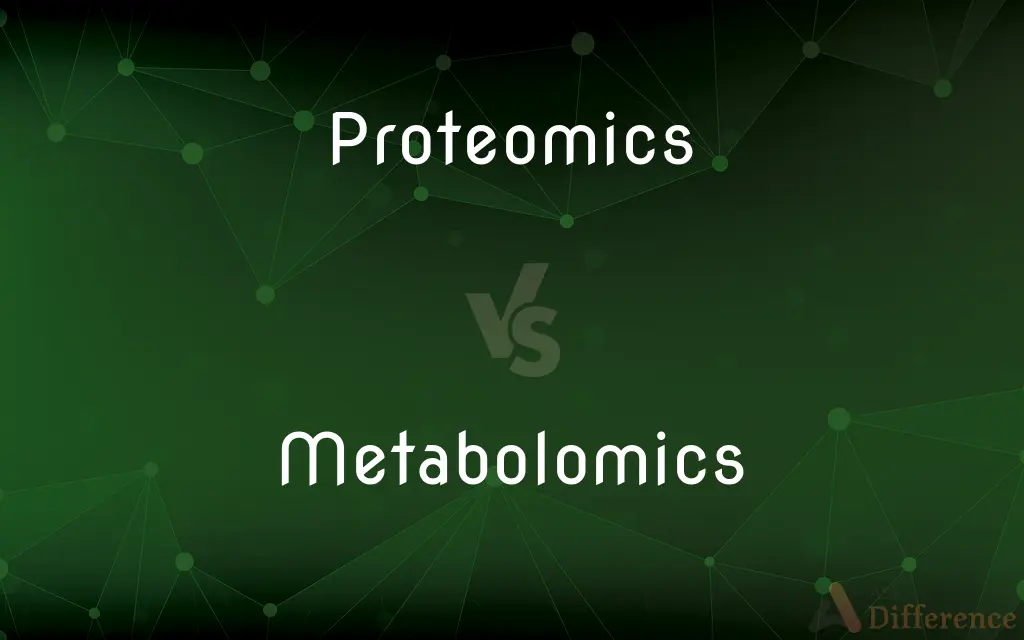Proteomics vs. Metabolomics — What's the Difference?
By Tayyaba Rehman — Published on November 9, 2023
Proteomics studies proteins in organisms, while Metabolomics focuses on their small-molecule metabolites. Both provide insight into cellular processes and functions.

Difference Between Proteomics and Metabolomics
Table of Contents
ADVERTISEMENT
Key Differences
Proteomics and Metabolomics are both fields of study within systems biology, analyzing biological molecules to understand an organism's structure, function, and interactions. While they converge in their goals to comprehend cellular activities, they diverge in their specific areas of focus.
Proteomics zeroes in on the study of proteomes, which are the entire sets of proteins produced by an organism. Since proteins are integral to carrying out most cellular functions, studying them gives invaluable insight into how cells operate, communicate, and respond to environmental cues. In contrast, Metabolomics concentrates on metabolites, the small-molecule chemicals involved in metabolism. These metabolites are the intermediates and products of metabolic reactions.
The techniques used in Proteomics largely involve mass spectrometry and 2D gel electrophoresis to identify and quantify proteins, discern their interactions, and determine their locations in cells. On the other hand, Metabolomics employs techniques like nuclear magnetic resonance (NMR) and different forms of mass spectrometry to identify and measure metabolite concentrations.
Understanding Proteomics can reveal the intricacies of disease pathways, leading to the discovery of potential drug targets. Meanwhile, Metabolomics can offer insights into an organism's physiological state, making it crucial for understanding diseases, phenotypes, and more. Essentially, while Proteomics offers a window into the tools a cell has, Metabolomics reveals what the cell is currently doing with those tools.
Comparison Chart
Focuses on
Proteins of an organism
Small-molecule metabolites of an organism
ADVERTISEMENT
Techniques Commonly Used
Mass spectrometry, 2D gel electrophoresis
NMR, Mass spectrometry
Provides Insight Into
Protein function, interactions, localization
Physiological state, metabolic pathways
Role in Disease Understanding
Understanding disease pathways, potential drug targets
Revealing physiological changes, biomarkers of disease states
Reflects
Tools available to the cell
Current cellular activities and reactions
Compare with Definitions
Proteomics
The study of the entire protein complement of a cell.
Proteomics can offer a detailed look into how cancer cells differ from healthy ones.
Metabolomics
Insight into an organism's metabolic state.
Metabolomics can indicate how a plant responds to drought conditions.
Proteomics
Insight into the protein dynamics of an organism.
Proteomics can reveal how proteins change in response to external stimuli.
Metabolomics
The study of chemical processes involving metabolites.
Metabolomics showed distinct metabolic profiles for athletes and non-athletes.
Proteomics
Research into protein interactions within a cell.
By understanding these interactions through Proteomics, scientists can decipher complex cellular pathways.
Metabolomics
Understanding the metabolic pathways in organisms.
Metabolomics can reveal how certain drugs impact metabolic activities.
Proteomics
A field utilizing technologies like mass spectrometry for protein analysis.
Proteomics technologies have seen vast improvements in the last decade.
Metabolomics
Analysis of small-molecule chemicals within a biological system.
Researchers use Metabolomics to understand how diets affect human health.
Proteomics
Analysis of protein structures and functions.
Advancements in Proteomics have paved the way for personalized medicine.
Metabolomics
Techniques like NMR are employed to study metabolite concentrations.
With advancements in Metabolomics, detecting diseases at early stages has become feasible.
Proteomics
(used with a sing. verb) The analysis of the expression, localizations, functions, and interactions of the proteins expressed by the genetic material of an organism.
Metabolomics
The study of the small molecules, such as sugars and amino acids, that are substrates, products, or intermediates of metabolic reactions in an organism.
Proteomics
(biochemistry) The branch of molecular biology that studies the set of proteins expressed by the genome of an organism.
Metabolomics
(biochemistry) The study of the range of metabolites present in a person's body at normal times, and when suffering from specific diseases; may be useful as a diagnostic tool.
Proteomics
The branch of genetics that studies the full set of proteins encoded by a genome
Common Curiosities
Can Metabolomics offer insights into diseases?
Yes, Metabolomics can reveal metabolic changes associated with diseases.
What techniques are commonly associated with Proteomics?
Proteomics often employs mass spectrometry and 2D gel electrophoresis.
Why is Proteomics essential in drug development?
Proteomics can reveal disease pathways and potential protein targets for drugs.
How do researchers determine metabolic pathways using Metabolomics?
Through Metabolomics, researchers study metabolite concentrations and their interactions.
Is Proteomics only relevant to human studies?
No, Proteomics applies to all organisms, including plants, bacteria, and more.
Can Proteomics help in understanding genetic disorders?
Yes, Proteomics can provide insights into how genetic mutations affect protein function.
Does Proteomics always provide a complete picture of cellular processes?
While insightful, Proteomics is one piece; integrating with genomics and Metabolomics offers a fuller view.
How does Metabolomics differ from Proteomics?
While Proteomics focuses on proteins, Metabolomics concentrates on small-molecule metabolites.
Are the results from Metabolomics static?
No, Metabolomics reflects a dynamic state, as metabolite levels change over time and conditions.
How have recent technological advancements impacted Proteomics?
Modern technologies have enhanced protein detection, quantification, and analysis in Proteomics.
What does Proteomics primarily study?
Proteomics studies the entire set of proteins produced by an organism.
How can Metabolomics benefit athletes?
Metabolomics can analyze metabolic changes during exercise, aiding in optimal training and nutrition.
Does Metabolomics have applications in nutrition research?
Absolutely, Metabolomics can reveal how different diets impact metabolic processes.
Can Metabolomics be used in agriculture?
Yes, Metabolomics can study how crops respond to various conditions, aiding crop improvement.
Are there any challenges unique to Proteomics research?
Yes, protein complexity, post-translational modifications, and diverse concentrations pose challenges in Proteomics.
Share Your Discovery

Previous Comparison
Continental Crust vs. Oceanic Crust
Next Comparison
Delhi vs. New DelhiAuthor Spotlight
Written by
Tayyaba RehmanTayyaba Rehman is a distinguished writer, currently serving as a primary contributor to askdifference.com. As a researcher in semantics and etymology, Tayyaba's passion for the complexity of languages and their distinctions has found a perfect home on the platform. Tayyaba delves into the intricacies of language, distinguishing between commonly confused words and phrases, thereby providing clarity for readers worldwide.
















































